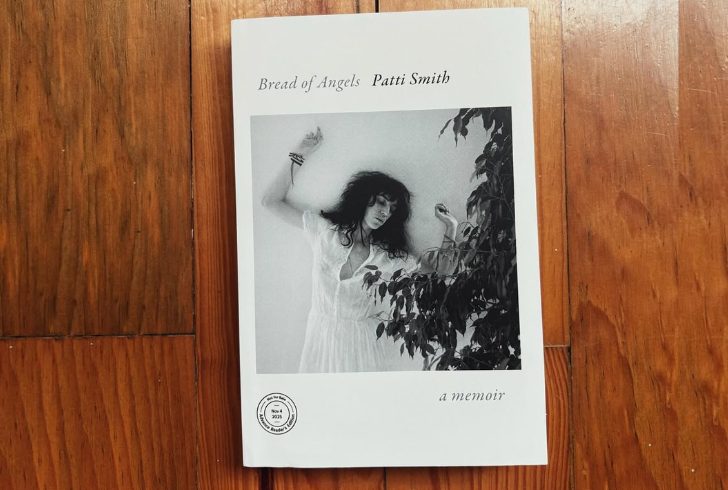Patti Smith has always defied categorization: poet, musician, and visionary whose creative energy feels simultaneously tender and enduring. Her latest memoir, Bread of Angels, continues this trajectory, revealing intimate fragments of her life while leaving much of her mystery intact. Through vivid recollection and candid emotion, Smith invites readers into a world shaped by art, faith, struggle, and perseverance.
Much like her National Book Award-winning Just Kids, Smith’s work navigates the tension between rebellion and reflection. In this memoir, she goes deeper, showing how pain and creativity intertwine. From a sensitive, imaginative child to a punk poetry icon, Smith traces a journey of living, loss, and relentless creation.
Roots in Resilience
Smith’s childhood reads like a storybook of endurance. Born in 1946, she moved 11 times in four years as her family faced financial hardship. Her mother worked as a waitress and took in ironing, while her father, a WWII veteran, labored quietly in factories. Despite hardship, their home thrived on poetry, books, and classical music.
Even amid illness, Smith’s imagination bloomed. She recalls a “Proustian childhood of quarantines and convalescence,” where stories and music filled the voids her body could not. Bedridden with migraines, she found solace and inspiration in her mother’s gift of Puccini’s Madame Butterfly.
A Child of Questions and Contradictions

Instagram | @thisispattismith | 'Bread of Angels' reflects Smith’s enduring search for understanding and connection.
From an early age, Smith exhibited spiritual curiosity. By three, she was asking her mother profound questions about the soul. Though she later followed her mother’s practice as a Jehovah’s Witness, she never restricted herself to a single spiritual path.
A screening of “Lost Horizons” introduced her to Tibetan philosophy and the idea that all things are connected, a belief that would shape her art forever.
Smith’s narrative does not rail against faith; it searches for significance, seeking to illuminate the invisible ties between creativity, existence, and belief. This yearning quietly animates Bread of Angels.
Finding Magic in the Mundane
Her early life demonstrates the alchemy of imagination. With no toys, her siblings made worlds from dresser knobs and ordinary coal. Discarded objects—a broken piece of jewelry, a rosary bead, even a bright blue toothbrush—were collected and stored under floorboards, each item treasured like a small, sacred talisman of wonder.
Her early life unfolds in vivid scenes: standing at railroad tracks with her mother, gathering coal for warmth; facing off with bullies as the fearless “general” of the Buddy Gang; pausing by a pond to watch a snapping turtle she calls “the king.” These moments blend hardship with hope, showing how imagination can transform scarcity into sanctuary.
Becoming an Artist
Art was never optional for Smith—it was essential. While classmates read Fun With Dick and Jane, she consumed Yeats and Irish mythology. At six, she scavenged Vogue magazines from trash bins, enchanted by the images that seemed to speak directly to her imagination.
A museum visit brought clarity. Standing before a Picasso, she understood her calling. “I knew then I was meant to be an artist,” she remembers. That certainty guided her through adolescence and eventually led her to New York City, where she chased a destiny she could not resist.
The New York Years
New York amplified Smith’s creative energy. What began as uncertainty blossomed into a current of artistic momentum. She encountered Robert Mapplethorpe, Sam Shepard, Allen Ginsberg, and William Burroughs, each of whom shaped her artistic voice.
“There was no plan,” she writes. “Only a natural upheaval that lifted me from the written word to the spoken.” With Lenny Kaye, she turned poetry into performance, channeling the spirit of Rimbaud into her lyrical rock.
When Horses arrived in 1975, it was more than an album—it was a revolution. “We didn’t make our record for fame,” she says. “We made it for the outcasts, the unseen, the art rats.” That honesty established her as a voice for the overlooked and the daring.
Love, Loss, and Rebirth
Even amid acclaim, Smith prioritized personal connection. Her marriage to Fred “Sonic” Smith brought quiet devotion, and together they nurtured creativity, raised two children, and built a “private version of paradise.”
Tragedy struck repeatedly: Robert Mapplethorpe, Fred, and her brother Todd passed away, each loss leaving its mark. Smith transformed grief into art, returning to the stage with renewed intensity. “Loss doesn’t silence us,” she reflects, “it gives our voice new shape.”
An Ongoing Dialogue With Death and Memory

Instagram | @sachynmital | Patti Smith’s "Bread of Angels" captures her tender reflections on love loss and lasting connection.
As “Bread of Angels” moves toward its final pages, Smith turns from recollection to reflection. She writes not from despair, but from a deep awareness of life’s impermanence. At seventy-eight, she confronts the idea of “shedding”, the slow, painful process of letting go.
“We fall back into the abyss we once climbed from,” she writes, “only to find ourselves turning the wheel once more.” Her words hold both resignation and grace, a poet’s acceptance that to love deeply is to lose profoundly.
She lists the remnants of her life: old fabrics folded in a trunk, medals, and beloved books. “All must fall away,” she muses. Yet one thing endures. “I will keep my wedding ring,” she writes, “and my children’s love.”
The closing passages carry the understated power that has always been Smith’s hallmark: fearless, honest, and unflinchingly human.
A Testament to Endurance and Artistry
In Bread of Angels, Smith offers more than recollections—she offers perspective. The book traces a life where faith, art, and perseverance converge, showing how moments of suffering can fuel acts of creation.
The book resonates with anyone who has loved, lost, or sought meaning. It illustrates that sorrow does not preclude beauty, and that even profound loss cannot extinguish the capacity for creation. Smith’s voice—as poet and witness—remains clear and deliberate, drawing readers in. Bread of Angels asks them not just to observe her life, but to feel it, to let its weight settle and linger. The effect is subtle, yet unforgettable.

